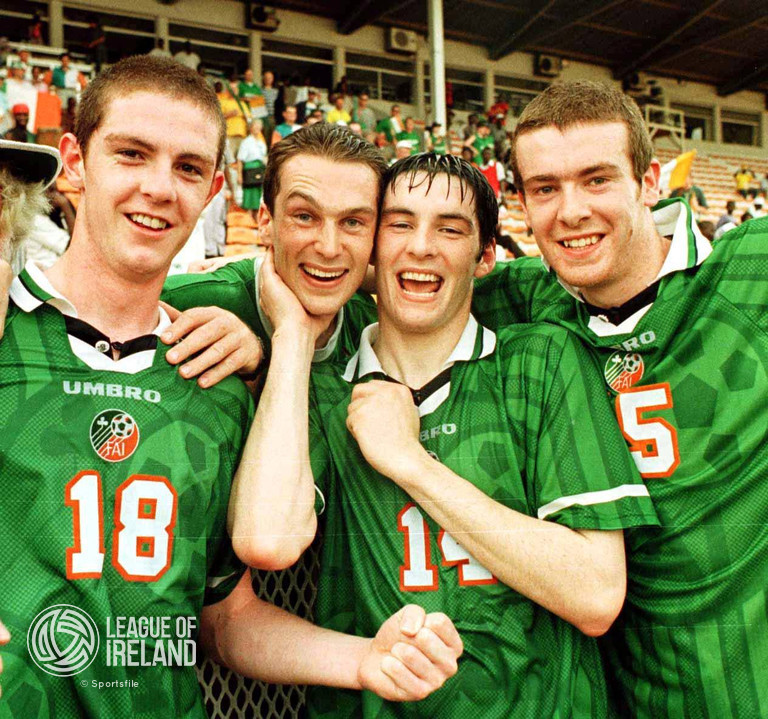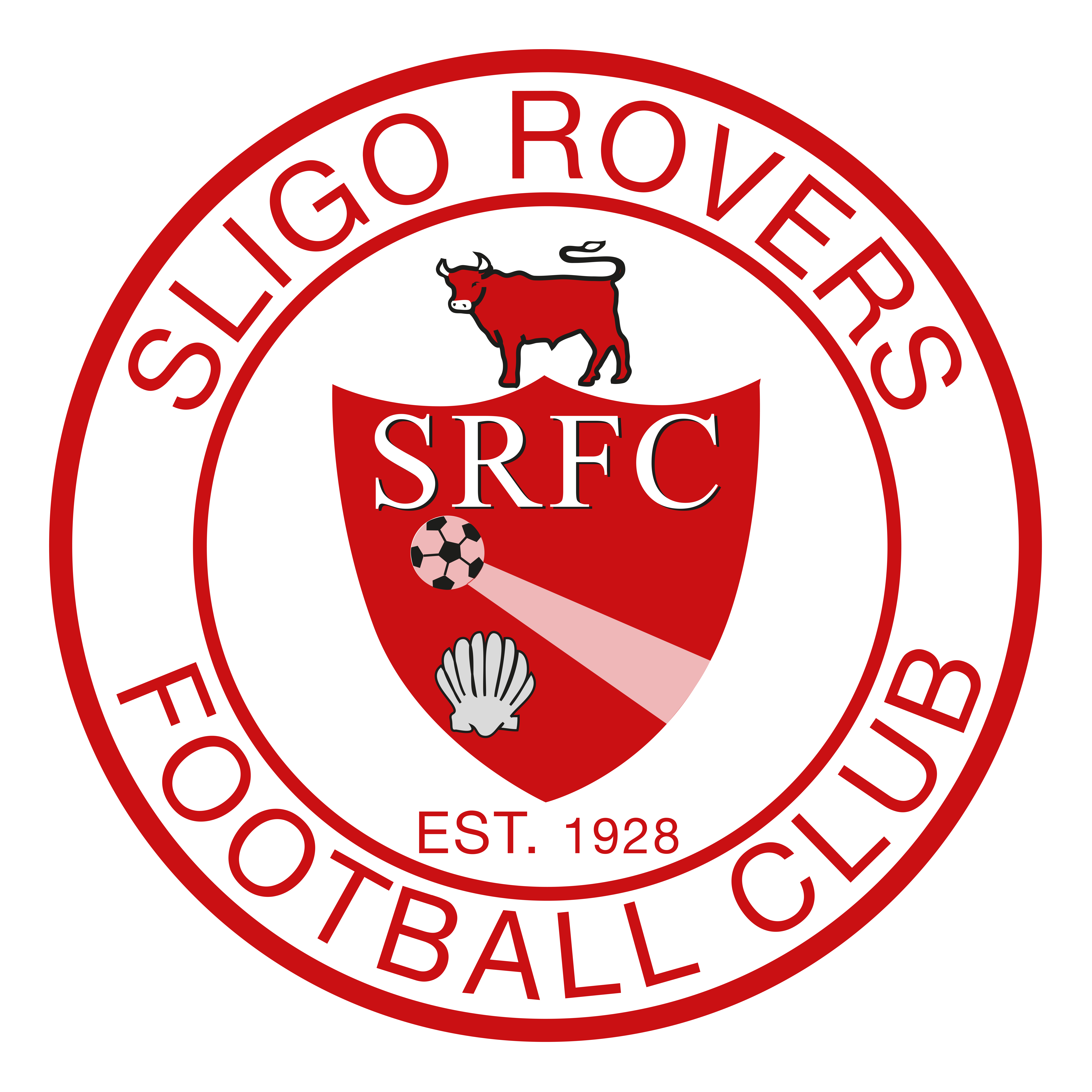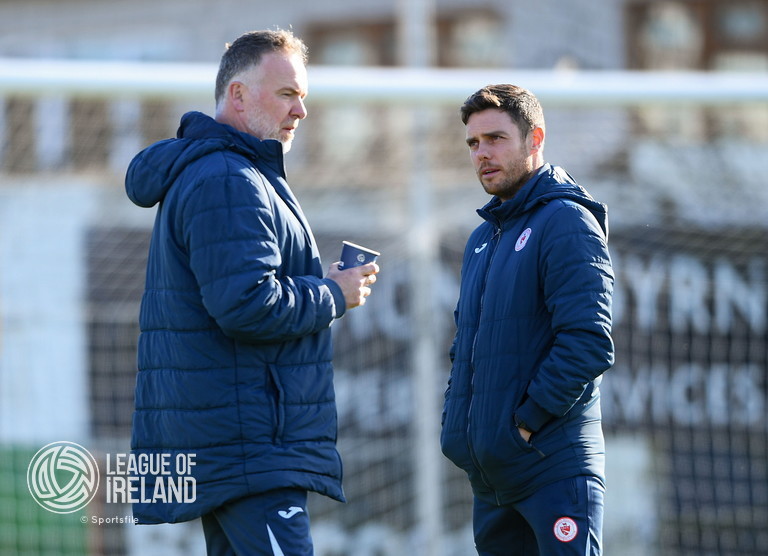BY JIM GRAY
Ryan Casey has been in and around professional football since he was 15 years old. Even before then, growing up in a football-mad household where his late father had been a professional player with Blackburn Rovers, he was nurturing the love of a game which was to become his life.
His impressive, if seldom heard back-story, means he brings a wealth of experience to the table as John Russell’s right-hand man at Sligo Rovers. One of the famous ‘Kerr’s Kids’ who won Ireland’s only under-18 European Youth Championship in 1998 and played at a youth World Cup a year later, he honed his skills as a professional player during a five-year stretch with Swansea City; he’s played with five League of Ireland clubs; been a Director of Coaching at a top academy in America, and before joining the Rovers’ coaching staff worked as the FAI Regional Development Officer in Sligo.
Born in Coventry, of Irish parents, he grew up in Galway City, where soccer, despite the county’s obsession with Gaelic games and rugby, was always a thriving sport. His parents, Peter and Kathleen, grew up just streets apart in Bohermore but had never met before moving to England. Their four daughters returned with English accents, but their six- month- old baby boy has no memory of ever having lived anywhere other than Ireland.
Ryan has memories, though, of playing underage football in Galway with a raw passion and bundles of ability, after the family had returned to its native roots. He played for youth club, Newcastle and his father’s club, Galway Hibs, and later travelled by train to Dublin every week-end to line out for Belvedere, where he was spotted by an eagle-eyed Swansea scout.
He signed for the Welsh club as soon as he’d finished his Junior Cert. His mother, though proud of his progress, wanted him to remain at home at least until he’d completed his Leaving Cert, but his father, enthused by his own background in the game, encouraged his young son to take the plunge.
“It wasn’t easy,” Ryan concedes. “Leaving home and family at 15 for a strange new place obviously presented a challenge. There were no mobile phones, no such thing as face-time. You had to find a pay-phone to ring home, and you couldn’t always afford it.
“But all I ever wanted was to be a footballer. Wild horses wouldn’t have held me back. I was living the dream.”
He made his first team debut as a 17 years old left-winger, under player/manager, Jan Molby, the former Liverpool legend. He would go on to play 150 senior games for the club across the lower leagues of the English pyramid, where team-mates included the current Portugal manager, Roberto Martinez and English striker, Lee Chapman.
“I loved Swansea,” he recalls. “It was one of those places, a lot like Sligo, where the club is the heartbeat of the community, and if the club is going well it seems the entire town is doing well. We’d be getting an average home attendance of about 10,000 and the place would be a sell-out for a big FA Cup game.”
One such cup tie produced a famous win over high-flying West Ham, who were backboned by the likes of Rio Ferdinand and Paulo Di Caneo. Swansea’s shock victory put Casey in the shop window, and a move to West Ham looked to be on the cards.
The Londoners’ first bid was rejected and as they were preparing to try again, Casey snapped his ankle in an inauspicious Coca Cola Cup game against Reading. The injury not only scuppered his move to the Premier League but caused an 18-month absence from the game.
There were happier times, though, in the Irish under-age set up under Brian Kerr and the late Noel O’Reilly. A scoring debut in a friendly against Northern Ireland helped secure his place in the squad for the 1998 European qualifiers and then on to the tournament itself in Cyprus, where the eight best teams on the Continent competed for the coveted crown.
In the group stages, Ireland beat Croatia and Cyprus and lost narrowly to hot favourites, England, who had future stars such as Alan Smith and Jonathan Woodgate in their ranks. But England then surprisingly slipped up against Croatia and Ireland were though to the final as rank outsiders against Germany.
Earlier that summer, Kerr’s under-16 team had won their European Championship, and the entire country it seemed tuned in to RTE’s coverage to see if the under-18’s could complete a remarkable double. Ireland took a 70th minute lead through Alan Quinn only for Germany to force the game to penalties with a 90th minute equaliser.
When Kerr sought volunteers for the dramatic penalty shoot-out, a plethora of hands shot skywards. Seeking the first-taker, however, he saw only Casey’s outstretched hand.
“Nobody was too eager to take the first one,” Ryan recalls. “We knew it was a big deal, a bit of history. We’d watched the under-16s winning only a few months earlier, so we were aware of all the excitement and we knew we’d be getting a fair bit of attention. Maybe that put a few people off taking the first one, but I had no problem with it. Dad had always taught me not to be afraid of penos, so I just stepped up and blasted it home.”
By the end of the nerve-wracking lottery, Luton’s Liam George had slotted home Ireland’s winner. Kerr’s kids had completed an historic double.
The following year, Ryan was part of the Irish youth squad who reached the last 16 of the youth World Cup in Nigeria.
“Noel O’Reilly was ahead of his time as a coach, and Kerr was a terrific motivator, instilling in us how proud we should be of our country and the jersey. We’d have gone through brick walls for them. We also had a lot of quality in the squad. Robbie Keane and Richard Dunne were already playing regularly in the Premier League, and six of the lads would go on to become senior internationals,” Ryan points out.

On the club front, Swansea went into administration in 2002 as the lower leagues plunged into a chaotic free-fall following the collapse of a television rights deal. It was time for Ryan to think about returning home, where better wages were now on offer in the League of Ireland. He would play for St. Pat’s, Cork City, Galway, Athlone and Longford as well as doing all his coaching badges.
This led to his first experience of living in Sligo in 2007, as he took up a full-time role with the FAI as Regional Development Officer for the area.
“As a player, I never really liked the Showgrounds. I don’t think I ever won a game there,” he recalls. “But I fell in love with Sligo once I came to live here. It’s home to me now. I love that sense of community, the passion for football, the family-friendly atmosphere at the club. I probably wouldn’t ever have envisaged it happening, but it has and I’m delighted.”
After a year as Director of Coaching with Everton’s New York academy, where he had a staff of 22 coaches looking after more than 600 young players, Ryan returned to Sligo, eventually linking up with Liam Buckley and John Russell. He became Russell’s assistant when his fellow Galwegian replaced Buckley at the helm.
He’s naturally delighted at how the season has gone so far, but quickly points out there is no magic wand. At a community-owned club, hard work and honesty are the basic requirements, and the next challenge is never far away.
He elaborates: “Myself and John go back a long way. We played together at Galway, and we’ve been pals for quite a while. We’d have basically the same football philosophy and we work well together. He’s a top-class manager, and people are beginning to see what he’s capable of.
“It’s a roller-coaster, of course. We work off a relatively small budget and it’s always a challenge. Thankfully, it’s going well at the moment. We have a very honest, hard-working bunch of players. Once you get players with the right attitude, you can put a shape together, try to improve them, and work hard every day. Then you’ve got a chance. The backroom staff are also a very tightly-knit bunch, all hard and honest workers, so it all helps in good times and bad.
“And then there’s the backing of the supporters. I got a sense of that when I was in the FAI job, a feeling that this really is a football-mad place. You can see how much the club means to everybody, and you buy into that. There’s a togetherness that you don’t always find in football.”
Now happily settled in Collooney with his wife, Claire, sons, Noah (9) and Charlie (8), and daughter, Isla (2), Ryan is happy that the family’s football DNA is being well nurtured.
“The boys play soccer for Ballisodare and Gaelic football with Owenmore Gaels, and they love it. They’re huge Rovers’ supporters, too. It’s something that will stay with them for life. We couldn’t be happier,” he says.

